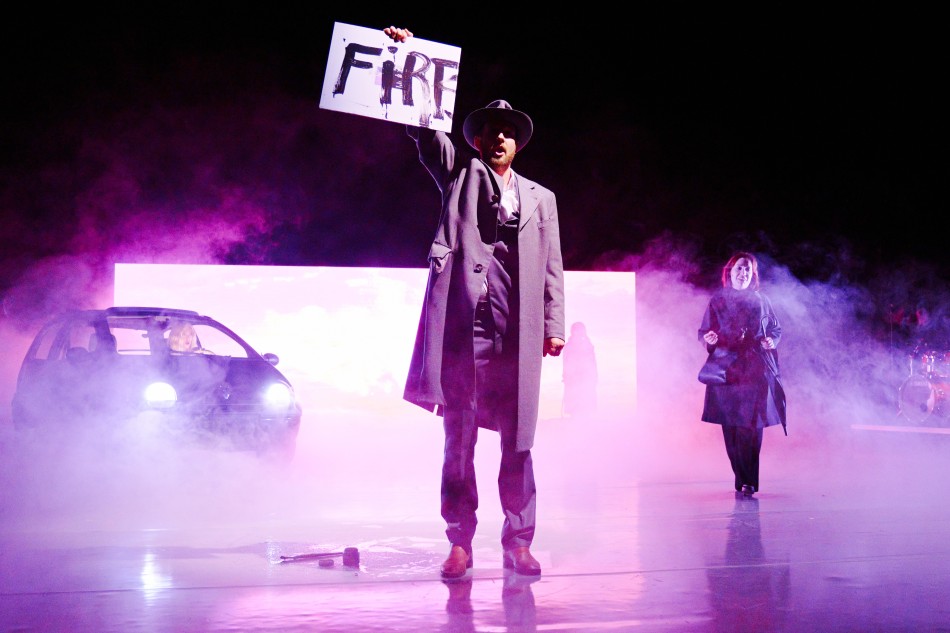Exiled theater director Kirill Serebrennikov knows the oppression of an authoritarian regime. In his article “Barocco” he shows what people go through to resist.
“Barocco” It begins tragically. It requires the viewer’s full attention for the next two hours. People in black coats stand motionless on the darkened stage. They protect themselves from the heavy rain with umbrellas. A shimmering lamppost towers in the foreground left. A man in work clothes climbs out to fix it. Under these weather conditions, a seemingly careless maneuver ends fatally for him: he gets an electric shock, gets stuck in the tendon belts, at first trembling, then motionless. Without much ado, he grieved for a moment and then was taken away. Second Attempt: In the role of the protagonist, a middle-class tenor singer climbs the lamppost. He makes it – his art brings enlightenment.
Like a baroque oil painter, theater director Kirill Serebrennikov applies thicker and thicker layers to his bleak works. A manifesto for artistic freedom and resistance to totalitarian regimes, dripping with symbolism and dramatic exaggerations. Despite the heaviness that grips it, there are also surprisingly light moments.
“I’ve been searching for a while For stories about people who set themselves on fire for an idea.”
The weary journalist
A less obvious story line, but the journalist’s utterly weary desperation forms the framework. Completely worn out by the suffering of the wars and oppression he speaks of every day, he escapes into the nightlife – dancing for the oppression. He does not succeed: he experiences with the audience in the course of his research the cruelty but also the ecstasy of people who risk their lives to protest and resist. Playing with fire, which is often taken literally in productions, which Kirill Serebrennikov also does knows himself. The Russian theater director now lives in exile in Germany.
Serebrennikov: From Moscow to Hamburg
Moscow, 2018: At this time, Serebrennikov is still the head of the guggul center, One of the most fashionable liberal theaters in the Russian capital. At the same time he is under house arrest. The accusation is: embezzlement of state funds in the millions. denies the truth. In such a situation, the Russian judiciary provides for large fines or imprisonment. He is not allowed to enter the theater, make phone calls, or use the Internet. Finally, after 20 months, he was released on parole. Transmitted by USB devices, he managed to bring the first version of “Barocco” to the stage in Moscow, despite being banned from working.
Hamburg 2023: The director of the largely defunct, and since removed, Gogol Center put Baroque extravagance in a relationship with privileged people who revolted against the regimes in 1968, according to the program booklet accompanying the Thalia Theatre. “Baroque symbolizes an irregular, slanting pearl that does not want to fit into a necklace – an image of the desire to be different,” explains Serebrennikov.
Italic pearly baroque
As an impressive example, the piece deals with the story of student Jan Palach, who set himself on fire in 1969 in protest of the dictates of the Soviet Union. A mixture of newly arranged Baroque arias–by Bach, Handel, and Monteverdi, among others–and Palach’s fight for freedom unleashes tremendous drama. For all of the theatrics, the piece remains so compelling because Serebrennikov so skillfully portrays his brilliant ensemble.
Every moment of the multi-media staged performance of “Barocco” is quite striking in its visual aesthetics, yet it works perfectly. Yang Ge balances gracefully on a wooden beam floating diagonally above the ground. The Chinese soprano, who has reached the finals in the Russian version of The Voice, firmly puts one foot in front of the other, and her voice relentlessly carries her to the top. Ge was already a participant in the Moscow premiere of the play. Because she was not allowed to return to Russia after a guest performance due to her Chinese passport, she now lives in Berlin.
For a few minutes, Danil Orlov lets time stand still: the musical director sits in the evenings at a grand piano, his right hand handcuffed to a carelessly smoking security guard. He plays Bach’s “chacone” with one hand – nothing can stop him.
breathers
The velvety, bright voice of Brazilian street singer Jovi, discovered by Serebrennikov during a stroll through Berlin’s Mauerpark, gives audiences the counterpart they so desperately need: Brazil’s most upbeat voices make audiences breathe a sigh of relief, at least for a moment.
In the midst of all the tragedy, Thilo Werner also gives a brilliant performance as a clown who plays violin and guitar: in several languages he sings about the fact that everyone has to die anyway. After being encouraged to clap, the spectators, almost relieved, join in.
At the end of the Big Bang
A plastic bag floating in the wind from two fans is reminiscent of the movie “American Beauty.” Over and over again, Serebrennikov takes famous cinematic scenes in “Barocco”. One of the most epic events in film history serves as the template for the grand finale: the explosion of a mansion built in the deserted mountainside of Zabriskie Point. An animated digital explosion on stage transforms all elements of everyday consumer capitalism into tiny, sparkling colored particles. What remains is a dull roar in the ears.
After several minutes of standing ovation, the crowded ranks of the Thalia Theater trembled under the audience’s applause. The omnipresent tension falls evenly from the faces of the band and the spectators.

“Explorer. Communicator. Music geek. Web buff. Social media nerd. Food fanatic.”







More Stories
A fossilized creature may explain a puzzling drawing on a rock wall.
MrBeast Sued Over ‘Unsafe Environment’ on Upcoming Amazon Reality Show | US TV
Watch comets Lemmon and SWAN approach Earth today